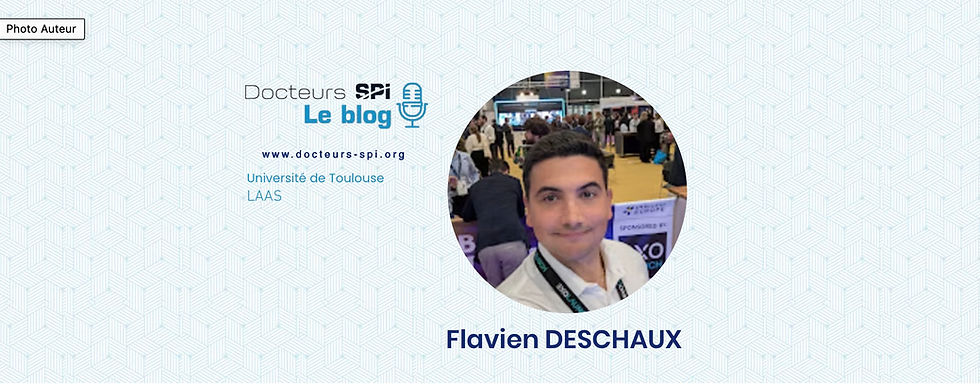A tour in the fascinating world of transparent electronics: from material to devices.
- Lorenzo BOTTIGLIERI

- 2 févr. 2024
- 3 min de lecture
Dernière mise à jour : 29 sept. 2024

Merci d'avoir accepté l'interview.
What was the subject of your Ph.D. research?
Climate changes represent the main challenge faced by humankind in the current century. The development of alternative and clean energy sources becomes then critical. One strategy to tackle this issue is through the development of new and green technologies, such as transparent electronics. This branch of electronics includes transparent photovoltaic devices and see-through optoelectronic devices. It’s my belief that transparent photovoltaics represents an excellent opportunity to tackle the increasing energy demand, by integrating solar cells into windows both for automotive and buildings, while respecting the environment. Nonetheless, the breakthrough of transparent electronics is hindered by the lack of p-type semiconducting oxides with adequate optical transparency and electrical conductivity, limiting the conception of transparent devices as well as transparent photovoltaic devices. In this framework, copper chromium oxide (CuCrO2) arises as promising candidate thanks to its optical, electrical and manufacturing properties. Moreover, it is well known that the composition of the film plays a major role over its properties.
My work was focused on the synthesis of out of stoichiometry CuCrO2 thin films by a low-cost, scalable and low temperature chemical deposition method, namely atmospheric pressure chemical vapor deposition (CVD), and their integration into see-through optoelectronic devices.
I successfully demonstrated the boost of the optical and electrical properties of this material by the fine tuning of the composition. I believe these findings are extremely attractive for further study on the Cu-Cr-O system. Moreover, I proved the potentiality of the integration of these materials in organic photovoltaic cells, by enhancing the lifetime of these devices. Besides, I fabricated record-breaking p-n junctions, demonstrating extremely high transparency and excellent electrical properties. The high performances and the manufacturing advantages of these devices are extremely appealing for the transparent electronic industry.
Can you please tell us more about your background and future perspective?
I have always been curious to understand how the world around me works. For this reason, I firstly enrolled in a bachelor in Physical engineering at the Politecnico of Turin. I then continued my studies with a master in nanotechnology for ICTs in the same university. During this master, I was awarded with the Erasmus scholarship to study at the FAME (Functionalized Advance Material Engineering) at the universitè Grenoble Alpes (UGA), Grenoble INP. I graduated from my master with an experimental thesis at the Laboratoire Materiaux Genie physique (LMGP) in Grenoble. I then enrolled in my Ph.D. at the LMGP under the IMEP 2 doctoral school. This research was done thanks to the collaboration with the LEPMI laboratory of Chambery.
My Ph.D. led to various (4) peer reviewed scientific articles and the possibility to present my work in 15 international conferences. I successfully defended my Ph.D. at the beginning of 2022. My Ph.D. thesis was awarded with the excellence award at the 2MGE specialty from the IMEP2 doctoral school.
Since August 2022 I am working as process engineer at ASM in Finland.
What would you say to future Ph.D. students about enrolling in a Ph.D. scholarship?
Do it! The Ph.D. is an extremely useful path. On one hand you will develop fundamental knowledge for future career as a researcher, such as data analysis, critical thinking and many technical skills. On the other hand, you will strongly enhance your interpersonal skills, such as public speaking, and data presentation in both oral and written form through conferences, redaction of papers and overall presentations of results.
From a more personal side, motivation and curiosity must be present in you to successfully undertake with this path. During the Ph.D. you will be for sure challenged, and as everything, there will be ups and downs. However, it will allow you to collaborate, brainstorm and discuss with interesting brilliant scientist from all over the world, and overall promoting your personal and professional growth. My feedback on the experience:10/10 😊





Commentaires